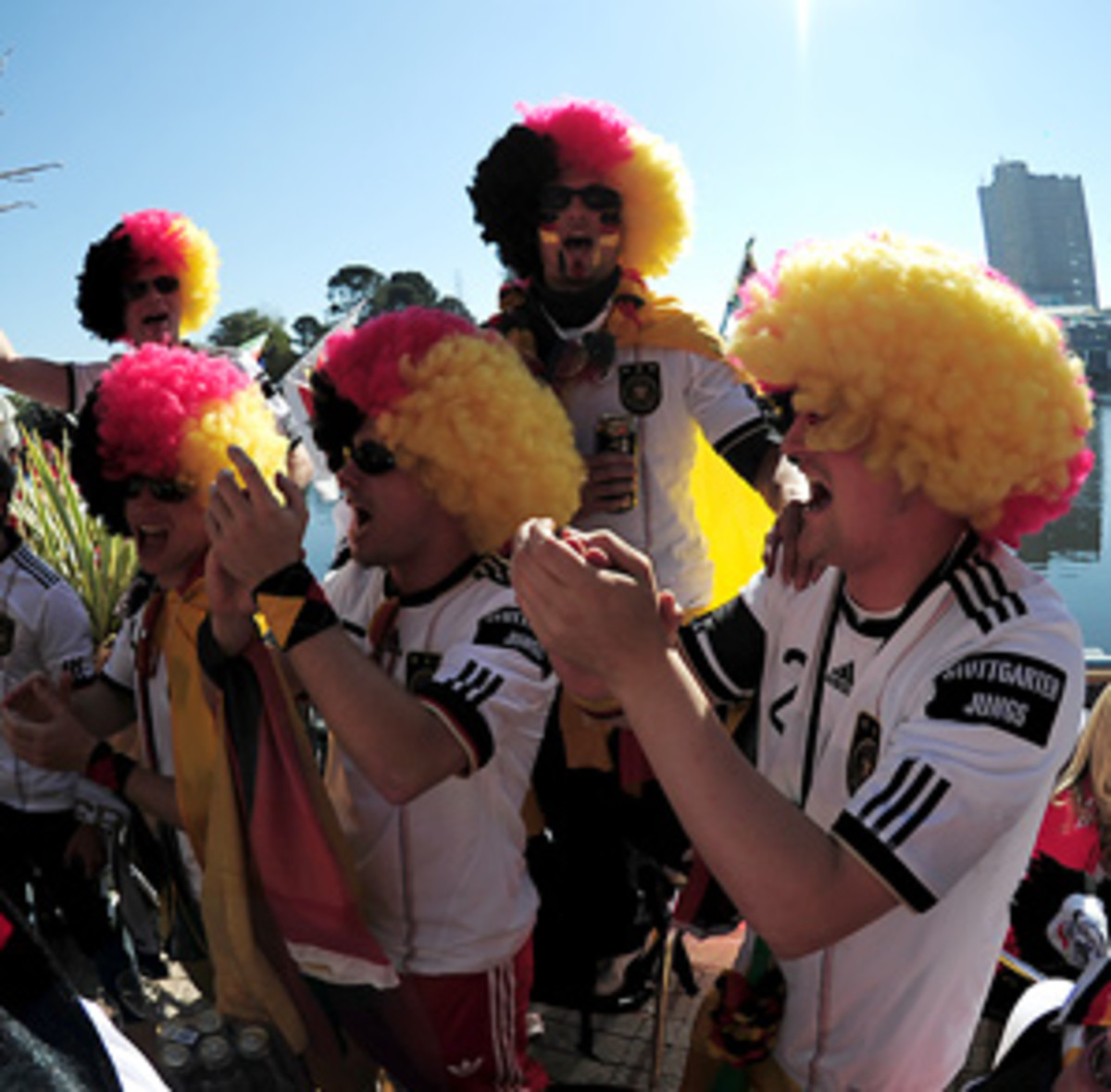Think Americans are fanatics? Try watching World Cup in Europe
Don't tell me about Super Bowl celebrations. I've seen them -- along with NBA parades and NHL parties and baseball lovefests.
They all are a pale, weak sibling compared to being in a country when its team wins a World Cup elimination game.
It's joyous. Raucous. A full-blown celebration of pride, unity and love -- without qualifiers about free agents or salaries or the future.
Last weekend, I stood on the "Fan Mile" in Berlin with 350,000 of my new best friends and watched Germany destroy Argentina 4-0. I was wearing the required red, black and yellow lei. Hey, when in Berlin ...
But Germany has become an easy team to root for.
In the withering heat, on the famous stretch of the Tiergarten between the Brandenburg Gate and -- appropriately -- the Victory Column, Germany emphatically earned a spot in the World Cup semifinals.
It was a fantastic, super scene -- to borrow to adjectives the Germans like to use. That is, unless you had any plans on sleeping later on that night. Late, late into the darkness, the car horns blared, the vuvuzelas sounded and the party continued. Cars packed with young people -- flying both the German and Turkish flags -- drove up and down the streets, holding up four fingers for the score and shouting "Deutschland!" The cold, plentiful German beer was flowing freely.
Germany has fallen in love with its young bold team, a cross-section of immigrants and old standbys. The team leads the World Cup in scoring and -- unlike some teams -- is confident and unafraid to shoot.
"We calling it the Summer Fairy Tale," one man told me. "In contrast to a Winter's Tale."
If so, it is the Summer Fairy Tale, Part II. The first version was four years ago when Germany hosted the World Cup. That was a party unlike any Germany had ever hosted. Everywhere I went, Germans expressed amazement at how happy everyone was, at the feeling of togetherness.
That was the first time since Germany was reunified that the country celebrated as one. Long fearful of appearing nationalistic, in 2006 Germans dropped their cautious exterior and celebrated both their country's exemplary job as host and their team's success (Germany lost to eventual champions Italy, 1-0, in the semifinals).
"Four years ago was the first time we felt it was okay to wave the flag," said Michael, my friendly, uber-excited hotel clerk.
This summer, it is even more okay. And it is with a growing pride over their young, exciting team.
"They do so many tasks," my taxi driver exalted.
They are a new looking team. While there are mainstays like Lukas Podolski and 32-year old Miroslav Klose, who needs just one more goal to tie the World Cup record of 15 held by Ronaldo, it is the young players that have created such excitement. Thomas Mueller -- his name is rarely spoken without the tagline "just 20 years old!" -- is the new fan favorite.
And there are players like Sami Khedira, Jerome Boateng and Mezut Ozil who come from immigrant families, making this German team -- much like the championship French team in 1998 -- symbolic of a new, multifaceted Germany.
Then there is naturalized Brazilian Cacau, to remind us which team in this tournament is playing the most fluid, rhythmic soccer (and which Germanic-like, plodding team went home in the quarterfinals and fired its coach Dunga in the aftermath).
On Saturday afternoon, just a few hundred meters from the Brandenburg Gate -- that symbol of German unification -- and from where the wall once stood, Germans hugged and cheered and celebrated their country and their team. Mueller scored the quickest goal of the tournament, less than three minutes in. The party was officially on.
As with so many other spots on the globe, this is a summer of worry -- about the economy and the future. But the only discontent on the Fan Mile was directed at German Chancellor Angela Merkel, when she was shown in the stands watching her team, and at Diego Maradona and Lionel Messi.
Other than those jeers, it was all happiness. And a party unlike anything we Americans get to experience in sports. We're fractured by cities and colleges and family tradition. Even in the Olympics -- as close as we can ever come to saying "we" when referring to our team -- the sports are generally niche sports, followed every four years, adopted only at the appropriate time.
The World Cup is the quadrennial culmination of most countries' sporting religion, each team infused with the character and anxiety and hopes of their nation.
And the celebration in victory is a sight to behold.
I imagine the party is still going on in Germany. I, however, have traveled on to Spain, the country of my original World Cup pick and Germany's opponent in the semifinals.
And the party is on here, too.






